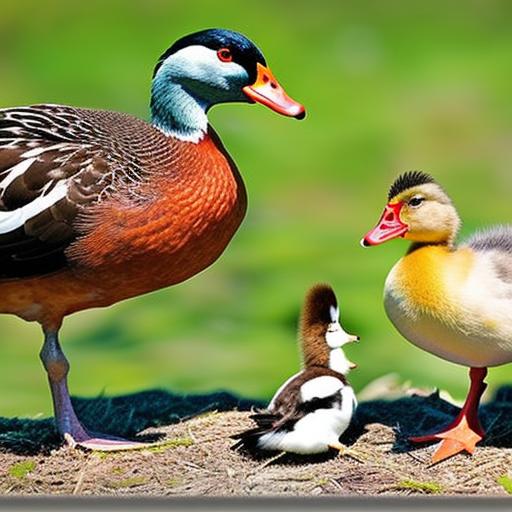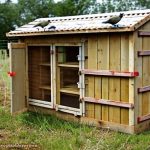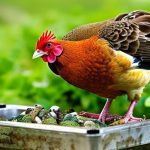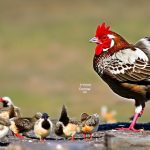Keeping chickens, ducks, and geese together has become a popular trend among backyard farmers and homesteaders. It’s a great way to maximize space and resources while enjoying the benefits of each bird. By combining these different types of poultry, you can create a diverse and sustainable flock that provides eggs, meat, pest control, and entertainment.
Key Takeaways
- Keeping chickens, ducks, and geese together can be a great way to have a diverse and productive backyard flock.
- Understanding the behavioral differences between these birds is important to ensure they can coexist peacefully.
- Benefits of keeping these birds together include increased egg production, pest control, and entertainment value.
- Considerations before keeping these birds together include space requirements, predator protection, and zoning laws.
- Housing and feeding requirements for chickens, ducks, and geese can vary, but all birds need access to clean water and appropriate shelter.
Understanding the Behavioral Differences between Chickens, Ducks, and Geese
It’s important to understand the behavioral differences between chickens, ducks, and geese before keeping them together. Chickens are social creatures that thrive in groups. They enjoy scratching the ground for insects and foraging for food. Ducks, on the other hand, are more independent and enjoy swimming and foraging in water. They have a unique ability to eat pests like slugs and snails. Geese are protective and territorial animals that make excellent guard animals. They are known for their loud honking and aggressive behavior towards intruders.
Benefits of Keeping Chickens, Ducks, and Geese Together
There are several benefits to keeping chickens, ducks, and geese together. Firstly, they can help control pests and weeds in the garden. Chickens will eat insects and scratch the ground for weed seeds, while ducks will eat slugs and snails. Geese can also help keep unwanted visitors away with their loud honking and aggressive behavior.
Secondly, these birds provide a variety of eggs and meat for consumption. Chickens lay eggs almost daily, while ducks lay eggs less frequently but produce larger eggs. Geese are not as prolific egg layers but can provide meat that is leaner than chicken or duck.
Lastly, keeping chickens, ducks, and geese together can be a source of entertainment. Each bird has its own unique personality and behavior that can be fascinating to observe. They can also be great companions, especially for children, as they can be easily tamed and enjoy human interaction.
Considerations Before Keeping Chickens, Ducks, and Geese Together
Before keeping chickens, ducks, and geese together, there are a few considerations to keep in mind. Firstly, check local regulations and zoning laws to ensure that you are allowed to keep these birds on your property. Some areas may have restrictions on the number of birds or the types of poultry that are allowed.
Secondly, consider the size of your property and the number of birds you want to keep. Each bird requires a certain amount of space to roam and graze. Chickens need at least 4 square feet per bird in the coop and 10 square feet per bird in the run. Ducks need access to water for swimming and foraging, so a pond or pool is necessary. Geese require a large area to roam and graze, so they may not be suitable for small properties.
Lastly, make sure you have the time and resources to care for these birds properly. They require daily feeding, watering, and cleaning of their coop and run. They also need regular health checks and veterinary care if necessary.
Housing Requirements for Chickens, Ducks, and Geese
Each type of poultry has specific housing requirements that need to be met for their health and well-being. Chickens need a secure coop and run that protects them from predators like foxes and raccoons. The coop should have nesting boxes for egg-laying and perches for roosting. The run should be covered with wire mesh to prevent birds from escaping or predators from entering.
Ducks require access to water for swimming and foraging. They can be housed in a secure coop with a small pool or pond nearby. The coop should have nesting boxes for egg-laying and perches for roosting. The pool or pond should be cleaned regularly to prevent the buildup of algae and bacteria.
Geese require a large area to roam and graze. They can be housed in a secure coop with access to a fenced-in yard or pasture. The coop should have nesting boxes for egg-laying and perches for roosting. The yard or pasture should be fenced to prevent geese from wandering off and to protect them from predators.
Feeding Requirements for Chickens, Ducks, and Geese

Each type of poultry has specific feeding requirements that need to be met for their health and productivity. Chickens need a balanced diet of grains, protein, and calcium. They can be fed a commercial chicken feed supplemented with kitchen scraps, vegetables, and fruits. They also need access to clean water at all times.
Ducks require a diet high in protein and access to water for foraging. They can be fed a commercial duck feed supplemented with insects, worms, and aquatic plants. They also need access to clean water for swimming and foraging.
Geese need a diet of grass, grains, and protein. They can be fed a commercial goose feed supplemented with grass, grains, and kitchen scraps. They also need access to clean water for drinking and bathing.
Health and Hygiene Considerations for Chickens, Ducks, and Geese
Keeping chickens, ducks, and geese healthy requires proper hygiene and care. The coop and run should be kept clean and dry to prevent the buildup of bacteria and disease. Regularly remove droppings, replace bedding, and disinfect the coop if necessary.
Provide fresh water and food daily to ensure that the birds are getting the nutrients they need. Monitor for signs of illness such as lethargy, loss of appetite, or changes in behavior. If you notice any signs of illness, seek veterinary care immediately.
Potential Problems When Keeping Chickens, Ducks, and Geese Together
There are a few potential problems that can arise when keeping chickens, ducks, and geese together. Chickens can be aggressive towards ducks and geese, especially if they feel threatened or if there is competition for food and water. It’s important to monitor their behavior and intervene if necessary.
Geese can be territorial and aggressive towards other birds, especially during breeding season. They may chase or attack chickens and ducks, causing injury or stress. Providing separate areas for each bird to eat and drink can help minimize aggression.
Ducks may not be able to compete with chickens for food and water, especially if they are housed together in a small space. Ducks require access to water for swimming and foraging, so providing a separate pool or pond can help ensure that they get the resources they need.
Tips for Keeping Chickens, Ducks, and Geese Together Successfully
To keep chickens, ducks, and geese together successfully, it’s important to follow a few tips. Firstly, introduce new birds slowly and monitor their behavior. Allow them to get used to each other’s presence before allowing them to interact directly.
Secondly, provide separate feeding and watering stations for each bird. This will help prevent competition and aggression over resources. Ensure that each bird has access to clean water at all times.
Lastly, provide plenty of space and resources for each bird. This will help minimize aggression and ensure that each bird has enough room to roam and graze. Consider the size of your property and the number of birds you want to keep when planning their housing and grazing areas.
The Joys of Keeping Chickens, Ducks, and Geese Together
Keeping chickens, ducks, and geese together can be a rewarding and enjoyable experience. With proper care and attention, these birds can thrive and provide a variety of benefits for the homesteader. They can help control pests in the garden, provide a variety of eggs and meat for consumption, and be great companions and sources of entertainment. By understanding their behavioral differences and meeting their specific needs, you can create a harmonious and sustainable flock that brings joy and productivity to your backyard or homestead.
If you’re considering keeping chickens, ducks, and geese together, it’s important to understand the dynamics and requirements of each species. While they can coexist harmoniously, there are certain considerations to keep in mind. In a related article on Poultry Wizard, you can learn more about the compatibility of different poultry species and how to create a suitable living environment for them. The article discusses the importance of providing adequate space, shelter, and access to water for chickens, ducks, and geese. To read more about this topic, check out the article here.
FAQs
What are the benefits of keeping chickens, ducks, and geese together?
Keeping chickens, ducks, and geese together can provide a variety of benefits, including pest control, fertilization of the soil, and a diverse range of eggs for consumption.
Is it safe to keep chickens, ducks, and geese together?
Yes, it is generally safe to keep chickens, ducks, and geese together as long as they are provided with adequate space, food, and water. However, it is important to monitor their behavior and health regularly to ensure they are not experiencing any issues.
What are the space requirements for keeping chickens, ducks, and geese together?
The space requirements for keeping chickens, ducks, and geese together will depend on the number of birds and their size. As a general rule, each bird should have at least 4 square feet of indoor space and 10 square feet of outdoor space.
What should I feed my chickens, ducks, and geese?
Chickens, ducks, and geese have different dietary needs, but they can all be fed a combination of commercial feed, grains, and fresh fruits and vegetables. It is important to provide them with a balanced diet that meets their nutritional needs.
What are some potential issues with keeping chickens, ducks, and geese together?
Some potential issues with keeping chickens, ducks, and geese together include aggression between birds, the spread of disease, and differences in dietary needs. It is important to monitor the birds regularly and address any issues that arise promptly.
Can I keep chickens, ducks, and geese together in a backyard setting?
Yes, chickens, ducks, and geese can be kept together in a backyard setting as long as local regulations allow it and the birds are provided with adequate space, food, and water. It is important to research local regulations and obtain any necessary permits before keeping backyard poultry.
Meet Walter, the feathered-friend fanatic of Florida! Nestled in the sunshine state, Walter struts through life with his feathered companions, clucking his way to happiness. With a coop that’s fancier than a five-star hotel, he’s the Don Juan of the chicken world. When he’s not teaching his hens to do the cha-cha, you’ll find him in a heated debate with his prized rooster, Sir Clucks-a-Lot. Walter’s poultry passion is no yolk; he’s the sunny-side-up guy you never knew you needed in your flock of friends!







